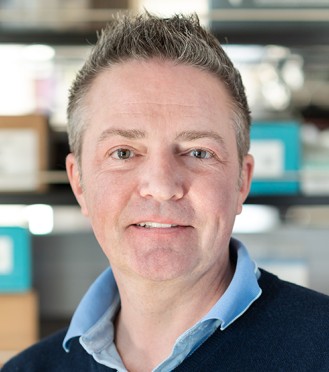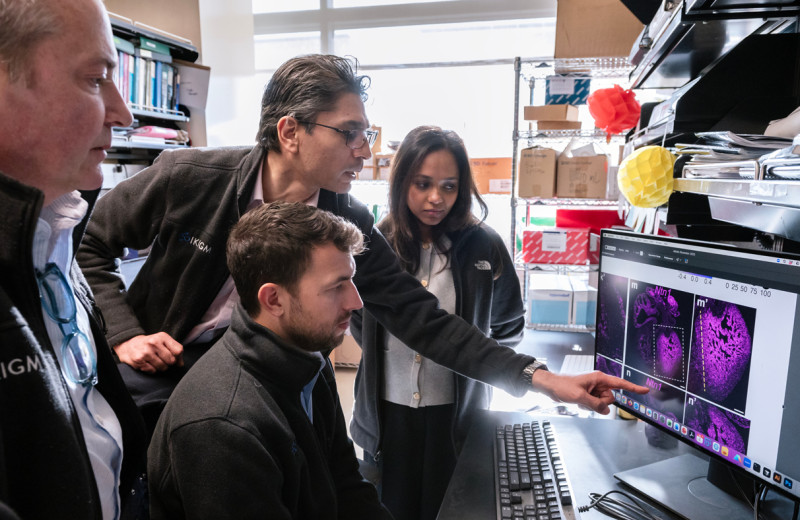Gladstone NOW: The Campaign Join Us on the Journey✕
On March 19, 2021, the Bruneau lab celebrated its 20-year anniversary with a 1-day virtual symposium. The symposium featured career panels and talks from current and former lab members from across the world.
Benoit Bruneau’s lab is broadly interested in understanding how genes are turned on and off during human development, and how this process is controlled during the formation of the heart in the embryo. Specifically, his team is investigating how errors in this process cause congenital heart disease. They use mouse models and human induced pluripotent stem cells to unravel the transcription factor networks that regulate sets of genes critical for heart development.
Watch the presentations from the symposium.
Opening Remarks
Benoit Bruneau, PhD
Director, Gladstone Institute of Cardiovascular Disease
Insulin-Producing Beta Cell Regeneration for Diabetes Remission
Heiko Leikert, PhD
Director, Helmholtz Munich
Epigenetic Control of Metabolism in Heart Failure
Paul Delgado-Olguín, PhD
Scientist, The Hospital for Sick Children
Coordinated Alternative Splicing and Alternative Polyadenylation
Pedro Miura, PhD
Assistant Professor, University of Nevada, Reno
Non-Academic Career Panel
- Jeffrey Alexander, PhD, Pre-Clinical Lead, Spark Therapeutics
- Aaron Blotnik, PhD, Data Scientist, Grail Inc.
- Kirstie Keller, PhD, Vice President of Programs, Additional Ventures
- Alex Mori, PhD, Medical Science Liaison, Alnylam
- Roopsha Sengupta, PhD, Editor-in-Chief, Club SciWri
- Mark White, PhD, Associate Director, BioPharma Marketing, BioRad
- Shan-Shan Zhang, PhD, Scientist, 23andMe
Gain of KRAS Function in the Endothelium Is Sufficient to Cause Vascular Malformations That Require MEK But Not PI3K Signaling
Joshua Wythe, PhD
Associate Professor, Cardiovascular Research Institute, Baylor College of Medicine
Dissecting Specification of Cardiac Precursor Cells at the Single Cell Resolution
Alexis Krup
Graduate Student, Gladstone Institutes
Chromatin Remodeler Brahma Safeguards Canalization in Cardiac Mesoderm Differentiation
Swetansu Hota, PhD
Scientist, Gladstone Institutes
The Extracellular Matrix Protein Agrin Is Essential for Epicardial Epithelial-to-Mesenchymal Transition During Heart Development
Xin Sun, PhD
Researcher, Oxford University
Support Discovery Science
Your gift to Gladstone will allow our researchers to pursue high-quality science, focus on disease, and train the next generation of scientific thought leaders.
Disrupted Boundary Between Cell Types Linked to Common Heart Defects
Disrupted Boundary Between Cell Types Linked to Common Heart Defects
Gladstone scientists identified a cellular boundary that guides heart development and revealed how disrupting it can lead to holes in the heart’s wall.
News Release Research (Publication) Congenital Heart Disease Cardiovascular Disease Bruneau LabCIRM Awards $7.5 Million in Discovery Grants to Gladstone Investigators
CIRM Awards $7.5 Million in Discovery Grants to Gladstone Investigators
Two ambitious research projects led by Gladstone investigators are boosted by funds from the California Institute for Regenerative Medicine.
Grants News Release Congenital Heart Disease Cardiovascular Disease Bruneau Lab Conklin Lab CRISPR/Gene Editing Human Genetics Regenerative MedicineMatters of the Heart: A Conversation with Gladstone’s Benoit Bruneau
Matters of the Heart: A Conversation with Gladstone’s Benoit Bruneau
Bruneau, director of the Gladstone Institute of Cardiovascular Disease, shares exciting recent advances in heart research and talks about the impact of predictive AI.
Gladstone Experts Heart Failure Cardiovascular Disease Alexanian Lab Bruneau Lab Pollard Lab Theodoris Lab AI




